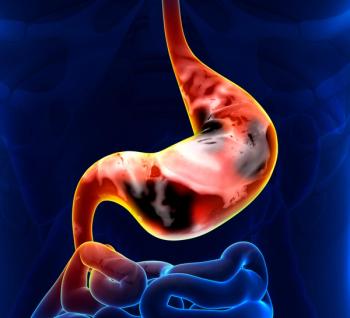
Possible ‘Breakthrough’ in Treating Refractory HER2-Positive Metastatic CRC
Combined therapy with trastuzumab and the tyrosine kinase inhibitor lapatinib shows promise against chemotherapy-refractory, HER2-positive colorectal cancers that do not harbor KRAS mutations.
Combined therapy with trastuzumab (Herceptin, Genentech/Roche) and the tyrosine kinase inhibitor lapatinib (Tykerb, GSK) shows promise against chemotherapy-refractory, HER2-positive colorectal cancers that do not harbor KRAS mutations, according to findings from a small open-label, phase II proof-of-concept trial
“Our findings show that the combination of trastuzumab and lapatinib is active, in the absence of any chemotherapy backbone, in heavily pretreated patients with metastatic disease,” reported authors from several cancer centers in Italy.
“In this heavily pretreated population, these outcome data are extraordinary, and they show the relevance of HER2 as a target in the treatment of colorectal cancer,” wrote Hans-Joachim Schmoll, MD, of Martin Luther University Halle-Wittenberg, in Germany, in an accompanying commentary that was also
Trastuzumab targets the HER2/neu receptor whereas lapatinib targets HER2/neu and EGFR pathways.
The phase II HERACLES clinical trial enrolled 27 patients with KRAS exon 2-wildtype, HER2-positive, treatment (including cetuximab [Erbitux] or panitumumab [Vectibix])-refractory colorectal cancer, between 2012 and 2015. At a median follow-up of 94 weeks, eight patients (30%) achieved an objective response--although only one of the eight had experienced a complete response, the study authors reported. The median response duration was 9.5 months. Twelve patients had stable disease. Progression-free survival (PFS) time ranged between 4 and 8 months (median, 5.2 months), supporting preclinical findings that had suggested the combination of trastuzumab plus pertuzumab is superior to chemotherapy in HER2-positive colorectal cancer.
Grade 3 adverse events were reported for six (22%) patients, including fatigue (n = 4 patients), skin rash (n = 1), or increased bilirubin concentration (n = 1). No grade 4 adverse events, drug-related serious adverse events, or patient deaths were reported.
The findings “could change the day-to-day clinical care management of patients with advanced HER2-positive colorectal cancer,” wrote the study authors. “Our findings could lead to the use of trastuzumab and lapatinib in earlier lines of treatment, with a possibility of chemotherapy-free regimens, for patients with HER2-positive tumors.”
The combination treatment “seemed to be more effective in tumors with HER2 immunohistochemistry scores of 3+ versus those with scores of 2+,” noted Dr. Schmoll. “However, even in low-HER2 expressers, activity was better than would be expected with no treatment. Therefore, patients with scores of either 2+ or 3+ should be considered candidates for HER2-targeted therapy.”
The findings also suggest that anti-HER2 therapy should be considered earlier in the treatment of colorectal cancer, Dr. Schmoll noted. “Since patients who-despite having KRAS wild-type tumors-never responded to cetuximab, responded well to anti-HER2 salvage therapy, a trastuzumab combination might seem preferable before trying an EGFR antibody-or even as a first-line therapy, as is being investigated in the ongoing MODUL trial (
The study authors concluded that a phase III trial “is warranted to provide more definitive data.”
The study was funded by Roche, the Italian Association of Cancer Research (AIRC), and Fondazione Oncologia Niguarda Onlus.
Newsletter
Stay up to date on recent advances in the multidisciplinary approach to cancer.






































